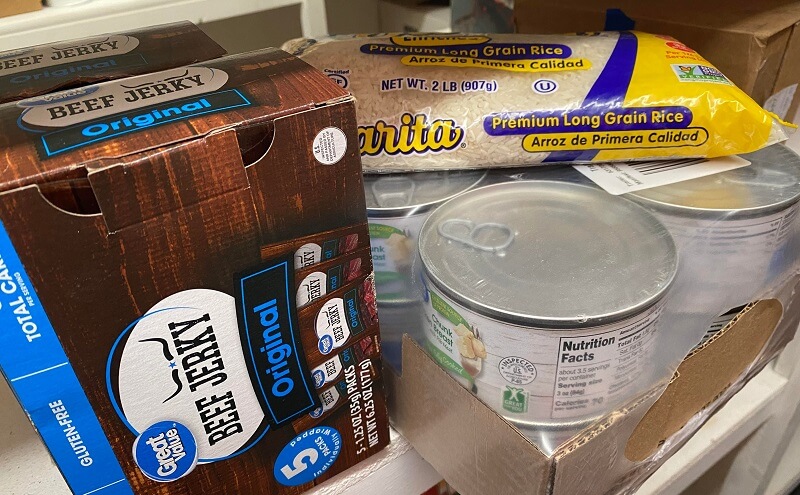Navigate This Post
In the aftermath of Hurricane Sandy, the “Storm of the Century”, I was dismayed and saddened to hear of people living in desperate conditions without water to drink and food to eat. It seemed almost impossible to me that with more than three days warning that adults were not able to prepare themselves for what everyone on television and the radio was calling the “FrankenStorm”.
Loss of the Survival Instinct
How, after 9/11, Hurricane Katrina, the deadly Joplin, MO tornados, and numerous other disasters, all in the last decade, could there be people who still did not understand the need to prepare for long-term power outages and shortage of food and water?
I think back to my childhood and watching my mother and grandmothers plant gardens, can food and stock our pantry or fruit cellar. This was a regular occurrence, not a one time event. I can recall when my family was snowed in for at least a full week during the Blizzard of 1977. We survived without harm. There were no helicopter airlifts of food to my neighborhood. We didn’t go all Donner Party and start eating each other. How can it be that less than forty years later we have devolved to a point where major cities cannot go 24 hours without electricity before turning into some post-apocalyptic nightmare?

The Artificial Life
I suppose the best term I can come up with is that of an artificial life. The digital era has provided us with more electronic distraction than we have the capacity to take in. Our news media, entertainment, and communication take place in the untouchable realm of cyberspace. Teenagers no longer stand in line for hours waiting to buy paper concert tickets or purchase record albums with glossy cardboard covers.
Lengthy telephone calls tethered to a corded handset while lying in a comfortable chair are a thing of the past. Ask yourself, when was the last time you actually called and spoke to a good friend rather than firing off a quick email or text?
Currency has become notional. Direct deposit, debit cards, and online accounts have all but done away with hard cash. We all know people who don’t even carry cash of any kind on their person. All of us are heading down a path where the concept of the “US dollar” will be almost inconceivable. We might as well refer to dollars as “Republic Credits”.
No, I wasn’t raised like Daniel Boone where I had to kill rabbits and squirrels for supper. We went to the grocery store. But, my mother always laid out part of the backyard or our property for a vegetable garden. When I was a teenager we operated a small farm and did indeed raise chickens, pigs, and a beef steer or two. We’d barter with the local butcher shop and trade part of the meat for the cost of the processing. Animals had to be fed and watered, regardless of how cold it was or how busy or tired we might have been.
Not Just for Kids
When we talk of an artificial life, it’s easy to ascribe this to modern kids with video games, iPods, and smartphones. However, it’s not the children who make the decision not to always have ample water, food, and life-sustaining supplies. Not just during hurricane season.
The convenience of the modern age has led far too many adults to fall into the “24 Hour WalMart” trap. That is, why ‘waste’ money on ‘extras’ when WalMart is open twenty-four hours a day? Anything you desire is a quick trip or online purchase away.
It’s an easy trap to fall into. We in the United States have been so prosperous by any historical standard. Even people our government classifies as “in poverty” have a color TV, mobile phones, cable television, Xbox, etc. Items that used to be perceived as luxuries are now perceived as staples.
An Innate Belief
There is an innate belief, if unspoken, that electronic gadgets and other distractions are the first priority and simple things like water, food, shelter, etc. are all a given. Someone, read the government, will make sure that there is always clean water to drink and food to eat.
A disturbing number of adults, who on the surface might seem to be productive members of society, have a naive belief that during an emergency it is the government’s job to provide all that they need to survive and be comfortable. “I pay my taxes”… blah, blah, blah. “They need to do something about this.”
Consider the object lessons of Hurricane Katrina and more recently Sandy. The state, despite good or nefarious intentions, depending on your point of view, does not have the capacity to care for each and every person affected by a catastrophe or disaster. The only thing the government can guarantee is an equal distribution of misery.
The Sinister Truth
What is most insidious about this artificial life syndrome is the fact that the state (big government) not only fosters the idea but promotes and encourages dependence. Rather than persuade citizens to be as self-sufficient as possible, they create and expand government programs designed to ensure dependency. People who collect rainwater or dig ponds on their property are persecuted by the EPA and other agencies. In cities nationwide, government permission is required to grow vegetable gardens.
Those who do strive for self-sufficiency are mocked in the popular press and media as “doomsday preppers”, a pejorative term, not one of endearment. They are referred to as “conspiracy theorists” and accused of “hoarding” food and supplies for themselves as if commercial products are a part of some collective.
One could legitimately ask, “if after two to three decades of constant bombardment from the nanny-state coupled with a near-complete disconnect from all things tangible?” Does the modern man even have the mental capacity to engage in his own self-preservation? Does he have the mental capacity to deal with discomfort and hardship? Have we lost our survival instinct?
The Solution
With an open mind and an honest heart, each man and woman must consider their own living situation. As you are reading this if the electricity were to go out for 48 hours and you were unable to access a grocery store, would you and your family continue to live comfortably? Replace electricity with tap water. If you turned on the tap and nothing came out, how long could you live comfortably without external assistance?
Each and every man and woman has choices to make. Living an artificial life might be a simple default, but it is still a choice. Deciding to ignore the subject or put your blind faith in the benevolent state is still a conscious decision. Like all things in life, decisions have consequences. Unlike the artificial world, you cannot hit the ‘reset’ button when things get tough.
For more detailed information about personal, family, and community preparedness and self-sufficiency, take a look at the “Patriot Fire Team Manual” from Paul Markel, available as a paperback or Kindle version..
Click Here to Leave a Comment >>
Professor Paul Markel
Latest posts by Professor Paul Markel (see all)
- Tactical Masturbation: Top 3 Stupid Human Tricks - July 8th, 2024
- Blood Trail: Fearless Fiction - June 21st, 2024
- SOTG and SB Tactical Celebrate Brace Ruling - June 20th, 2024
- Shotgun Accessories: Practical and Useful - June 14th, 2024
- Tactical Rifle Tips: Transition Drills - January 5th, 2024






Recent Comments